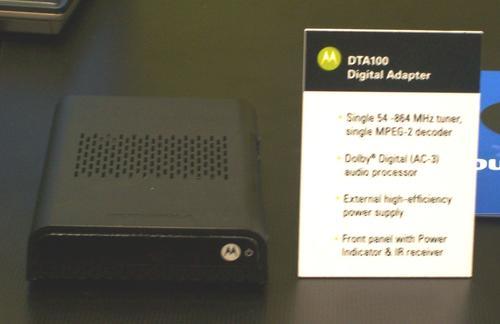Upgrades from Comcast Media Center and Motorola will enable smaller MSOs to reclaim analog using digital terminal adapters

Some upgrades from Comcast Media Center (CMC) and Motorola Inc. (NYSE: MOT) will allow smaller cable operators to begin deploying simple digital terminal adapters (DTAs) in their systems, giving those cable companies a chance to reduce the amount of analog spectrum they're using.
The upgrades will apply to small and mid-sized cable operators that obtain digital programming from HITS Quantum, a centralized platform from which CMC delivers more than 210 linear, high-definition, and standard-definition video and audio services. About 200 MSOs operating more than 2,000 local cable system headends use the HITS Quantum service. (See HITS Upgrades for DTAs.)
The new additions will allow Motorola headends hooked into HITS Quantum to manage DTA devices alongside the deployed base of more traditional digital set-top boxes. The CMC and Motorola said they are already conducting tests with the DTA and expect to offer commercial support for the device using by this fall.
The implementation should broaden the scope and adoption level of DTA technology. Comcast Corp. (Nasdaq: CMCSA, CMCSK) already has plans in place to use DTAs to fuel an all-digital strategy set for the back half of this year that will affect 20 percent of the MSO's markets and enable Comcast to reclaim about 40 analog channels. (See Comcast Confirms Digital Dongle Project and Comcast Spreads the Love .) The move should also free up spectrum for high-definition, Docsis 3.0, and other services that absorb valuable bandwidth.
Although industry sources indicate that Motorola could end up with the bulk of Comcast's DTA orders, the MSO also has DTA purchase deals with Pace Micro Technology and Thomson S.A. (NYSE: TMS; Euronext Paris: 18453). (See Comcast Gives Thomson Nod for DTAs and Picking Up the Pace (DTA).) The new CMC-Motorola implementation will support DTAs from multiple vendors, a CMC spokesman confirmed. (See DTAs on Parade .) 
Priced at less than $40 per unit, DTAs are designed to convert incoming digital video feeds to analog form so older TVs can view the signal. DTAs are also inherently one-way, so they do not support video-on-demand or an interactive program guide. Operators are expected to use them to convert analog customers as more (if not all) programming is moved to digital. Existing digital cable customers may also use them to support less frequently used analog TV sets that aren't already receiving programming through a regular digital cable set-top.
"DTA devices are an essential step in the industry's move toward an all-digital platform," said CMC SVP and COO Gary Traver, in a statement. "The CMC is dedicated to making the transition to digital as smooth as possible for cable systems serving smaller markets."
Waiver concerns
But the emergence of DTAs is coupled with a bit of regulatory tension. The big question now is whether these DTAs will use a conditional access system or another form of encryption. If they do, deployment of the devices, despite being unidirectional, might require a special waiver from the Federal Communications Commission (FCC) in the wake of a set-top security integration ban that went into effect last July. (See Countdown to 'Seven-Oh-Seven'.)
By way of example, the Consumer Electronics Association (CEA) is opposing a three-year waiver request by Evolution Broadband LLC, another DTA vendor, in part because Evolution's product employs a CAS from Conax AS . At least one cable operator, Massillon Cable TV Inc., reportedly wants to go all-digital using the Evolution implementation.
Evolution has since fired back in a filing with the FCC last month, claiming the CEA's opposition to the waiver is a "transparent attempt… to interfere with low-cost technology aimed at extending the utility of analog TVs and facilitating the transition to digital services."
— Jeff Baumgartner, Site Editor, Cable Digital News
About the Author(s)
You May Also Like











